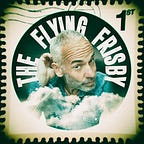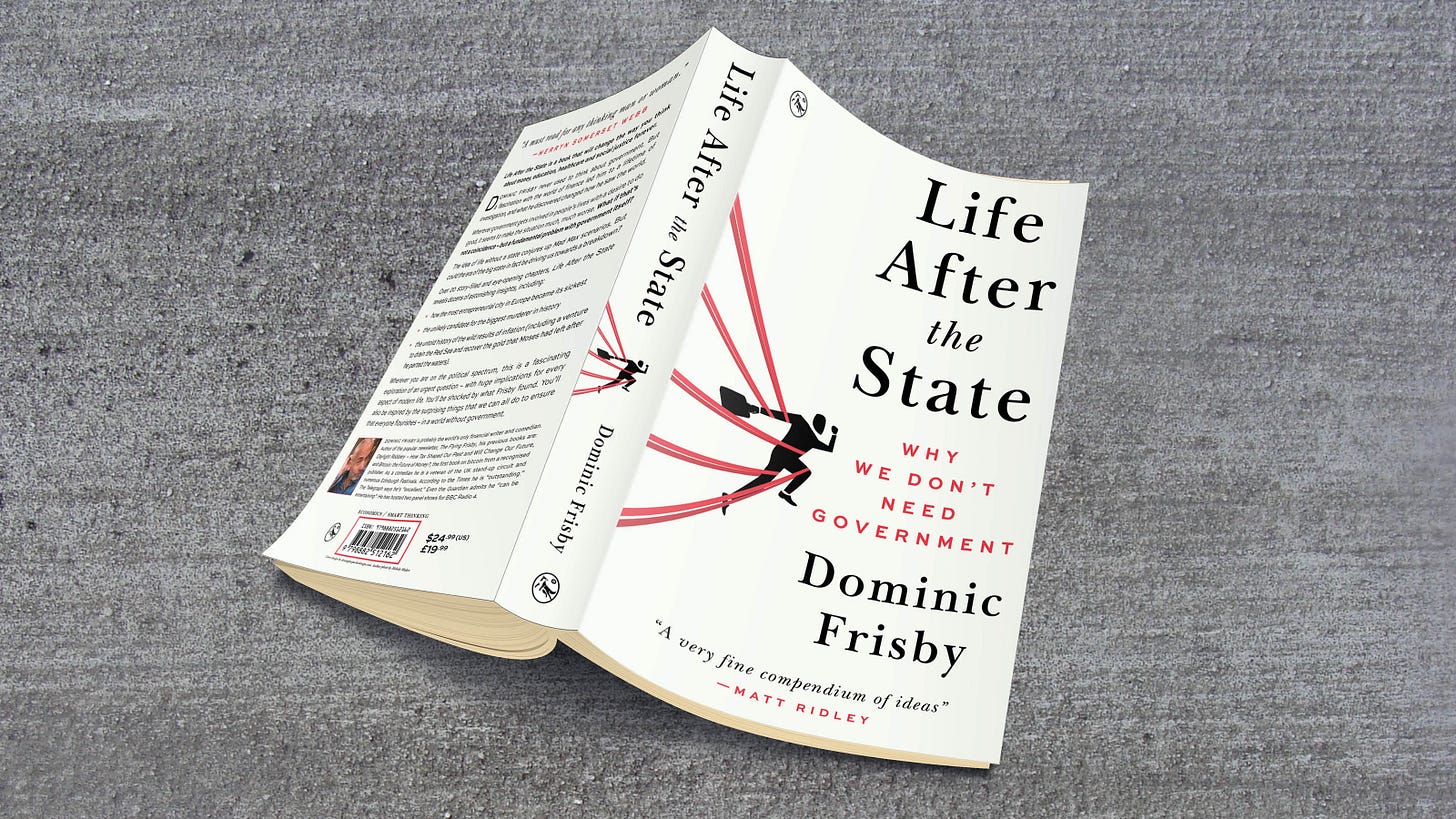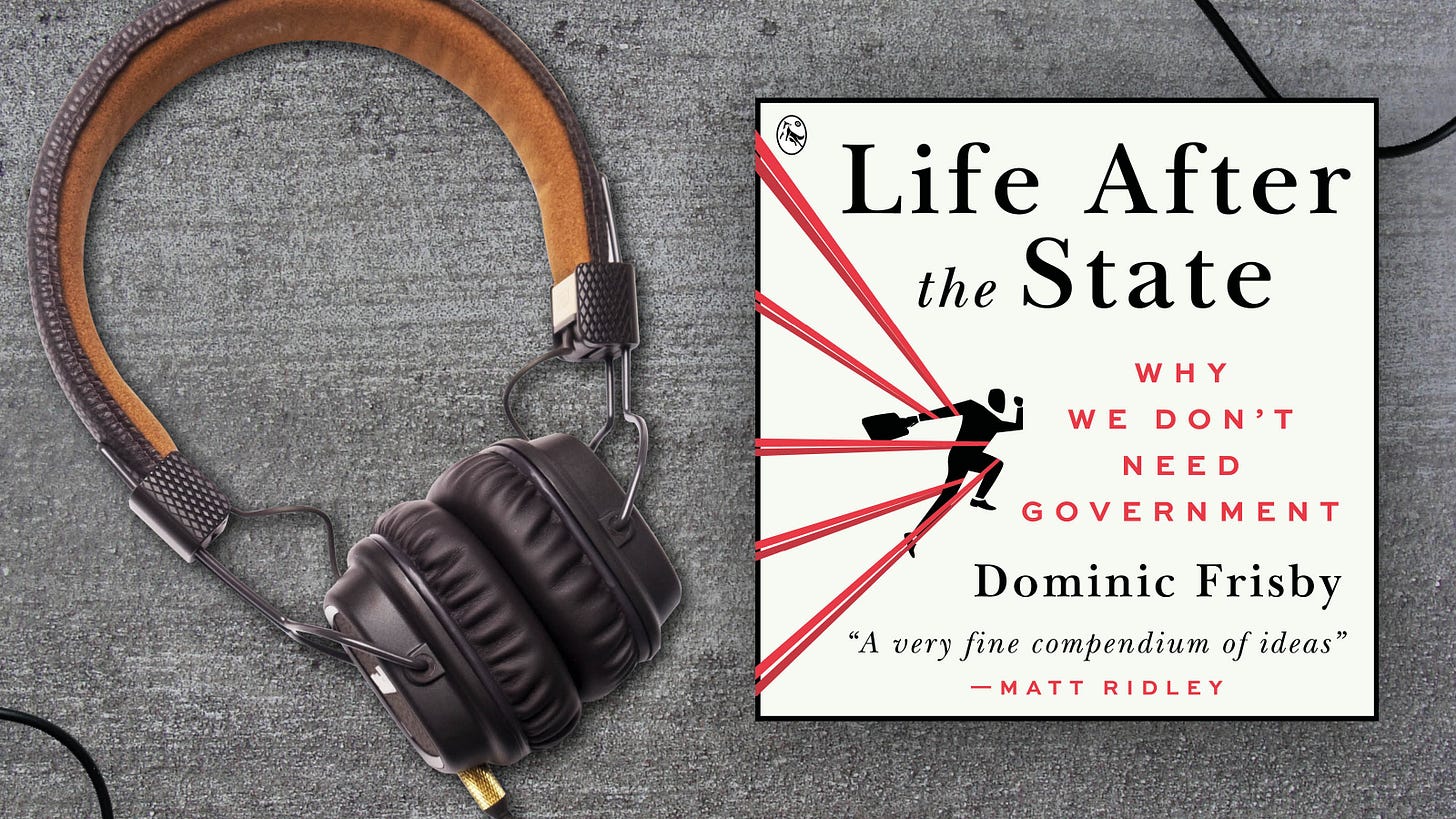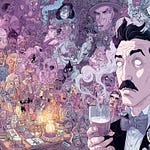Good Sunday morning to you,
I am putting back my promised piece on gold miners until mid-week, so keep a look out for that.
Meanwhile, Life After the State - Why We Don’t Need Government (2013), my first book, and many readers’ favourite, which fell out of print last year, is now, thanks to the invaluable help of my new buddy Chris P, back in print (Amazon, Apple Books), with the audiobook here (Audible, Apple Books).
I’m very proud of the some of the reviews it had - “A brilliant book,” Steve Baker; “A must read,” Merryn Somerset Webb; “Something extraordinary,” James Harding; “Incredibly readable", Al Murray and so on.
But, as is often the way, my favourite review came from a “random on the internet”, an Amazon reviewer: “The most important book I have read in a long time. I’ve just bought five extra copies, and plan to force it on all I meet, in the manner of a Jehovah’s Witness.” :)
Today, for your Sunday morning thought piece, I thought I’d publish a short extract. I hope you enjoy it.
(First edition paper backs are now trading hands, by the way, for over £200. No hardbacks for sale - so all those who helped fund it back in the day, if you’ve still got your copy it’s worth something).
In the 1990s, when I was in my twenties, I was mad about Latin America. I loved the people, the tropical weather, the forests, the mountains, the beaches, the language, the ancient history – and I was nuts about the music. All I wanted to do was go there and have adventures. Every year I would catch a cheap Boxing Day flight and come back at the beginning of February. I went to all sorts of wonderful places: Colombia, Bolivia, Brazil, Chile, Guatemala, Peru, Honduras and, in 1996, Cuba.
This wasn’t at the height of Cuban repression. Fidel Castro was still president and the very worst of the poverty that followed the collapse of the Soviet Union was now behind it. But the country was still desperately poor.
Havana was an amazing place, full of contrasts. The only cars were either huge American classics – symbols of booming 1950s USA that looked like something off the set of Back to the Future – or dour and bleak Ladas that had been imported from the Soviet Union in the 1970s and 80s, symbolic of the Cold War and communism. There were magnificent Art Deco or Art Nouveau buildings, yet there’d be a hole in the roof, or part of it had fallen down. There were pro-Castro symbols and slogans everywhere you looked, but the walls on which they were painted would be crumbling. The entire city looked like it needed re-rendering.
After one obligatory, over-priced night in a government hotel, I found a room in a Havana apartment belonging to a well-educated Cuban family. Luis was a political economist and a professor, no less; Celia was a doctor. They had three young children: two girls and a boy.
I had gone to Cuba with preconceived notions about what an amazing place it was. Any problems it had were entirely due to sanctions and other American punishments, I thought. It had the best health service in the world, the best education in the world and was a shining example to the greedy West on how things could be run. I don’t know where I got those ideas from – conversations at university, probably – but Luis quickly put me right.
‘What is the point of a great hospital, if there is no medicine?’ he would whisper to me. ‘What is the point of great schools when you have no paper?’ I didn’t have an answer.
I say whisper. Criticism, even indoors, was always whispered. Many Cubans would loudly declare how wonderful the regime was, surreptitiously look about to check no potential informant was in earshot, then come up close and whisper, ‘I hate Castro’ – or something along those lines. So oppressive was the regime that paranoia, secrets, denial and deception permeated every area of life. People didn’t dare to be honest. They were too scared of what the repercussions might be.
Some Cuban friends of mine in London had told me before I left, ‘You need dollars. You can’t buy anything with pesos.’ I was a pretty intrepid explorer in those days and dismissed this advice. I thought I’d be able to get off the beaten track into the real Cuba, where I could use pesos like real Cubans. But my friends were right. You couldn’t. There was, simply, nothing available to buy with pesos. There were no shops or businesses that accepted pesos, except the odd street stall that sold ice cream or bits of cooked dough, loosely described as pizza. Cubans got their bread and other essentials with ration books and a lot of queuing.
Western goods did exist. Clothing, electrical and hardware goods, and food and drink – Havana Club rum, beer, cheese and cured meats, for example – were sold in grey, colourless supermarkets. The supermarkets were not at all cheap and, despite the fact that they were state-run, would only accept US dollars – one of the many hypocrisies I would encounter.
So the only way anyone could buy anything was with US dollars at a state-run store. However, most people were employed by the government in some way or other, and paid in Cuban pesos. So how did they get dollars?
The answer was: from tourists.
Luis and Celia got their dollars renting out a room to people like me. Most Cubans didn’t have the option of an apartment with three bedrooms. (Luis’s parents had somehow managed to avoid it being expropriated.) Some were lucky enough to have the use of a car and could be taxi drivers. But this was another option that was only available to a tiny few – there was no manufacture of cars and no import trade. You, or more likely your parents, would have somehow had to have acquired a car way back when, and kept hold of it. There were a few restaurants and bars scattered about, and a tiny, well-connected elite could become waiters. Where did that leave everyone else?
As an economist and a doctor, you’d expect Luis and Celia to be a fairly wealthy couple. And by Cuban standards they earned good salaries – about 500 pesos a month each. The official exchange rate was one peso to the dollar, thus they earned the equivalent of $500. The unofficial rate, however – the real market rate – was 20:1, so Luis and Celia’s 500 pesos amounted to about $25. A pair of jeans in the supermarket cost twice that. But, remember, you couldn’t actually buy anything with pesos.
One night’s rent from me was more money than Luis, with a PhD, would earn in an entire month. A taxi driver might land that figure in two or three fares. On a good night, a waiter might earn that in tips. But the big money was in selling sex. If she found a generous boyfriend, a prostitute – a ‘jinetera’, as they were called – could earn many times that in one night.
More than any of the other European nations, it was Italy that seemed to have caught the Cuba bug. My flight out was full of Italians. All over Havana there were Italians. They loved Cuba. I naively thought it might have to do with the historical links between Italy and communism, but wandering around Havana I soon saw another reason. The Italian men loved the black Cuban women – and vice versa, it seemed. Everywhere you looked you’d see stylish Italian men arm in arm with young Cuban black girls, their paid girlfriends for the two weeks they spent there.
Cuban men were selling their bodies too. A rather plump Greek- English woman I knew in her late forties married a beautiful (yes, beautiful) man – a ‘jinetero’ – at least 25 years her junior. I had to deliver some money to him for her. I was amazed when I met him. He looked like a young Sidney Poitier. She looked like a chubby, middle- aged Bette Midler. A most unlikely couple.
In some cases, I’ve no doubt, couples fell in love. Marriages and families may have resulted. Cuba is a famously sexual country. I expect that many of the jineteras derived some occasional pleasure from their work. But, in most cases, the reality was rather more dark and sinister. Their economic circumstances meant that these people felt they had no other option but prostitution, if they wanted to improve their lot.
It’s hard to believe just how widespread ‘jineterismo’ was, and probably still is. There has been no formal study, but anecdotally it appears that more than 50% of Cuban women below 50 have practised prostitution at some stage – if not with a tourist, then with another Cuban.
‘Everyone is jinetera,’ said Luis. ‘Look around. Everyone. Jinetero, jinetera. Look what Fidel has done to our country. Look what he has done to our people’.
We were sitting on the Malecón – the wall which runs along the Havana sea front – watching good-looking jineteros and jineteras attempting to snare a tourist. Of all the Latin American countries I visited, I found I had the most intense conversations in Cuba. This was one of them. I transcribed it into my diary later that night. ‘I don’t want my children to be a doctor like their mother, or a political economist like me. What is the point? MD, PhD, a month’s work and I cannot buy a pair of shoes.’ Luis continued: ‘Useless life. A much better life for my son is if he is a taxi driver or a waiter. Then he can get dollars. Maybe he can get a tourist to fall in love with him. And my daughters? I tell you a secret. I pray my daughters will be beautiful. Every father does. So they can have tourist boyfriends, have money, maybe marry a tourist, and get out of here. That is why every Cuban father wants his daughter to be a jinetera. Jinetera – that is the best life you can have here, that is how you survive, that is how you escape. Thank you, Fidel!’
I don’t know what the motivation behind Castro’s great revolution was or why he and his cohorts made the economic and political choices they did – lust for power, political idealism, or, maybe, just to get rid of Batista. It seems his decision to ally himself with the Soviet Union was, at least initially, more of a reaction to US aggression and sanctions than any deep Marxist sentiment. I very much doubt their intention was the eventual consequence: a society so imbalanced and distorted that taxi drivers and uneducated young people could earn, in one night, many times more than a professor, a doctor, a lawyer or an engineer might earn in a month; where the large majority of young girls in Havana were selling their bodies for dollars, and where every Cuban father wanted his daughter to be a jinetera.
Cuba was probably my first lesson in the Law of Unintended Consequences. And my story illustrates many of the themes of this book: the power of the state; how the state interferes in people’s lives; how political decisions, often made out of expediency, even if benevolent, can have such grave and unexpected repercussions; why the freedom to trade and exchange is so important; and how, if you limit that freedom, you limit people’s possibilities.
The useless peso, moreover, was my first experience of how essential a properly functioning system of money is to a society, and what can happen when politicians start to use money as a political tool.
Life After the State is available at Amazon, Apple Books and all good bookshops, with the audiobook at Audible, Apple Books and all good audiobookshops.
Until next time,
Dominic
PS If you missed my report into buying gold, it is here:
(Any issues downloading the PDF, please reply to this email or try this link).














